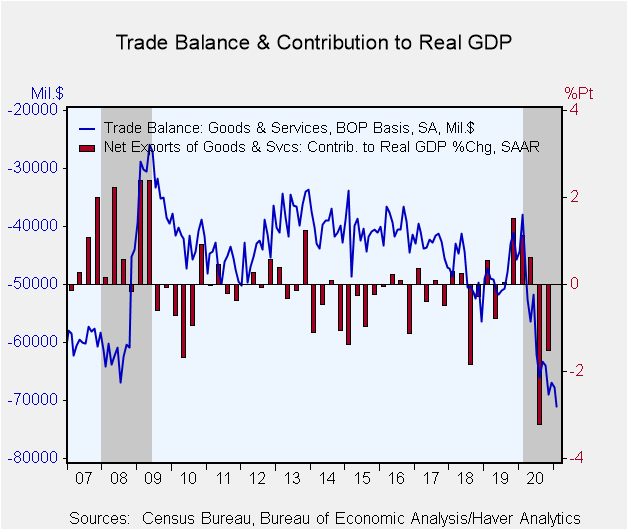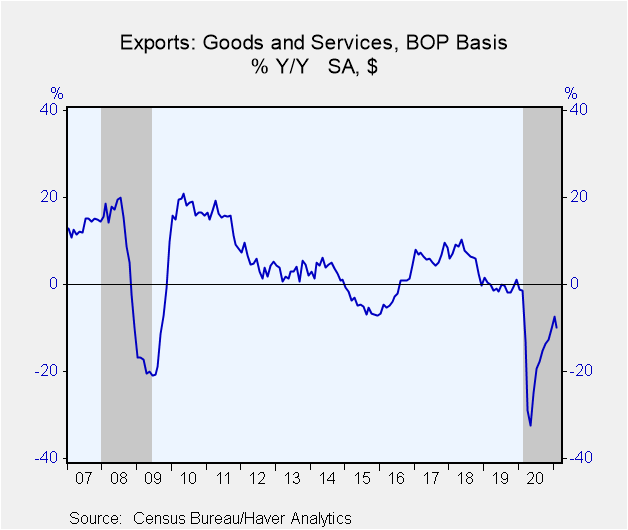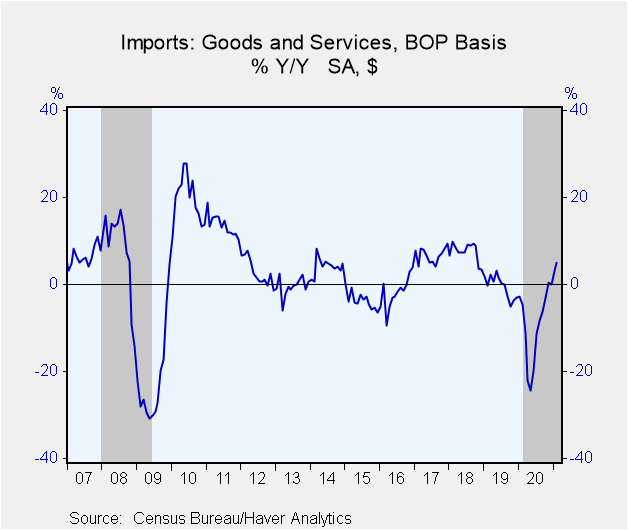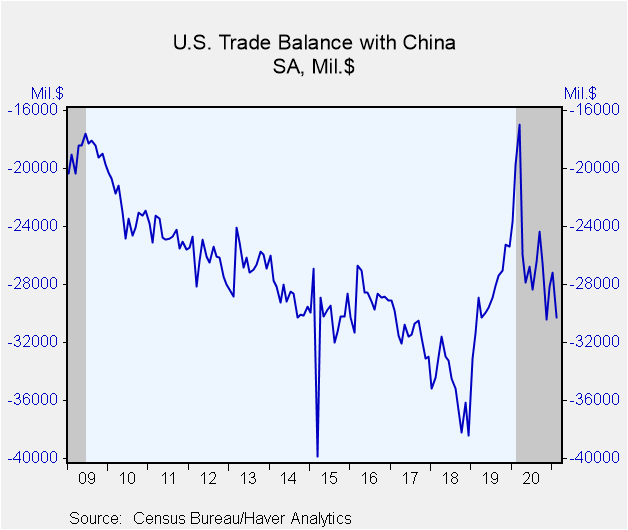 Global| Apr 07 2021
Global| Apr 07 2021U.S. Trade Deficit Widens to Record during February
by:Tom Moeller
|in:Economy in Brief
Summary
• Exports fall sharply with economic weakness abroad. • Imports decline modestly. • Oil price rise softens import decline. The U.S. trade deficit in goods and services widened to $71.1 during February following a deepening to $67.8 [...]
• Exports fall sharply with economic weakness abroad.
• Imports decline modestly.
• Oil price rise softens import decline.
The U.S. trade deficit in goods and services widened to $71.1 during February following a deepening to $67.8 billion in January, revised from $68.2 billion. The deficit was a record for this measure which dates back to January 1992. The Action Economics Forecast Survey anticipated a $70.5 billion deficit.
Exports fell 2.6% (-10.0% y/y), the first decline in nine months. Imports were off 0.7% (+5.0% y/y), also the first decline since May of last year.
The trade deficit in goods increased to a record $88.0 billion in February from $85.2 billion in January. The advance trade data reported earlier showed an $86.7 billion goods deficit. Exports of goods declined 3.6% (-5.1% y/y) as nonauto consumer goods exports weakened 5.8% (-5.1% y/y), down sharply for the second straight month. Capital goods exports fell 5.9% (-12.5% y/y) while auto exports weakened 5.6% (-10.6% y/y), about as they did in January. Imports of goods weakened 1.0% (10.5% y/y), the first decline in nine months. Auto imports fell 10.7% (-7.8% y/y), down sharply for the second straight month while nonauto consumer goods imports fell 4.2% (+18.8% y/y). Capital goods imports edged 0.3% higher (14.4% y/y).
Petroleum imports increased 8.7% in February (-12.3% y/y) as prices rose. In constant dollars, oil imports fell 1.5% (-11.6% y/y), the third decline in four months. Nonoil imports weakened 1.5% (+12.4% y/y), off for the first time since May.
The February trade surplus in services narrowed to $16.9 billion. It was the smallest surplus since January 2012, down from a peak surplus of $26.6 billion in March 2018. The value of services exports eased 0.4% (-19.6% y/y) for the second straight month, reflecting a 1.5% decline (-69.6% y/y) in travel exports. Charges for the use of intellectual property were off 0.3% (+4.2 y/y). Imports of services edged 0.6% higher (-17.4% y/y) after a 1.2% decline. Travel imports declined 1.5% (-72.9% y/y). Intellectual property imports edged 0.1% higher (-11.5% y/y).
The goods trade deficit with China deepened in February to a seasonally adjusted $30.3 billion. Exports fell 30.4% (+38.8% y/y) and imports declined 3.5% (+49.5% y/y). The trade deficit with Japan narrowed sharply to $4.5 billion and the deficit with the European Union narrowed slightly to $19.0 billion.
The international trade data, including relevant data on oil prices, can be found in Haver's USECON database. Detailed figures on international trade are available in the USINT database. The expectations figures are from the Action Economics Forecast Survey, which is carried in AS1REPNA.
| Foreign Trade in Goods & Services (Current $) | Feb | Jan | Dec | Feb '20 | 2020 | 2019 | 2018 |
|---|---|---|---|---|---|---|---|
| U.S. Trade Deficit ($ bil.) | 71.08 | 67.82 | 66.97 | 38.01 | 681.70 | 576.86 | 579.94 |
| Y/Y% | |||||||
| Exports of Goods & Services (% Chg) | -2.6 | 1.1 | 3.4 | -10.0 | -15.9 | -0.4 | 6.4 |
| Imports of Goods & Services (% Chg) | -0.7 | 1.2 | 1.7 | 5.0 | -9.5 | -0.5 | 7.5 |
| Petroleum (% Chg) | 8.7 | 15.9 | 10.6 | -12.3 | -39.9 | -14.0 | 20.8 |
| Nonpetroleum Goods (% Chg) | -1.5 | 0.9 | 0.9 | 12.4 | -3.6 | -0.4 | 7.4 |
Tom Moeller
AuthorMore in Author Profile »Prior to joining Haver Analytics in 2000, Mr. Moeller worked as the Economist at Chancellor Capital Management from 1985 to 1999. There, he developed comprehensive economic forecasts and interpreted economic data for equity and fixed income portfolio managers. Also at Chancellor, Mr. Moeller worked as an equity analyst and was responsible for researching and rating companies in the economically sensitive automobile and housing industries for investment in Chancellor’s equity portfolio. Prior to joining Chancellor, Mr. Moeller was an Economist at Citibank from 1979 to 1984. He also analyzed pricing behavior in the metals industry for the Council on Wage and Price Stability in Washington, D.C. In 1999, Mr. Moeller received the award for most accurate forecast from the Forecasters' Club of New York. From 1990 to 1992 he was President of the New York Association for Business Economists. Mr. Moeller earned an M.B.A. in Finance from Fordham University, where he graduated in 1987. He holds a Bachelor of Arts in Economics from George Washington University.










